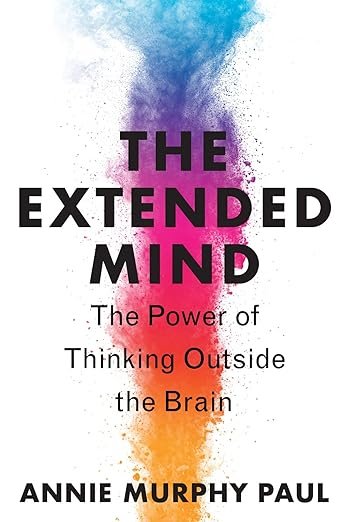 Image 1 of
Image 1 of


The Extended Mind: The Power of Thinking Outside the Brain
By: Annie Murphy Paul
USE YOUR HEAD. That’s what we tell ourselves when facing a tricky problem or a difficult project. But a growing body of research indicates that we’ve got it exactly backwards. What we need to so, says acclaimed science writer Annie Murphy Paul, is think outside the brain. A host of “extra-neural” resources — the feelings and movements of our bodies, the physical spaces in which we learn and work, and the minds of those around us— can help us focus more intently, comprehend more deeply, and create more imaginatively.
This book outlines the research behind this exciting new vision of human ability, and excavates the untold history of how artists, scientists, and authors—from Jackson Polluck to Jonas Salk to Robert Caro— have used mental extensions to solve problems, make discoveries, and create new works. Paul offers a dramatic new view of how our minds work “that invites us to radically change how we think about thinking” (Joshua Foer).
By: Annie Murphy Paul
USE YOUR HEAD. That’s what we tell ourselves when facing a tricky problem or a difficult project. But a growing body of research indicates that we’ve got it exactly backwards. What we need to so, says acclaimed science writer Annie Murphy Paul, is think outside the brain. A host of “extra-neural” resources — the feelings and movements of our bodies, the physical spaces in which we learn and work, and the minds of those around us— can help us focus more intently, comprehend more deeply, and create more imaginatively.
This book outlines the research behind this exciting new vision of human ability, and excavates the untold history of how artists, scientists, and authors—from Jackson Polluck to Jonas Salk to Robert Caro— have used mental extensions to solve problems, make discoveries, and create new works. Paul offers a dramatic new view of how our minds work “that invites us to radically change how we think about thinking” (Joshua Foer).
By: Annie Murphy Paul
USE YOUR HEAD. That’s what we tell ourselves when facing a tricky problem or a difficult project. But a growing body of research indicates that we’ve got it exactly backwards. What we need to so, says acclaimed science writer Annie Murphy Paul, is think outside the brain. A host of “extra-neural” resources — the feelings and movements of our bodies, the physical spaces in which we learn and work, and the minds of those around us— can help us focus more intently, comprehend more deeply, and create more imaginatively.
This book outlines the research behind this exciting new vision of human ability, and excavates the untold history of how artists, scientists, and authors—from Jackson Polluck to Jonas Salk to Robert Caro— have used mental extensions to solve problems, make discoveries, and create new works. Paul offers a dramatic new view of how our minds work “that invites us to radically change how we think about thinking” (Joshua Foer).

